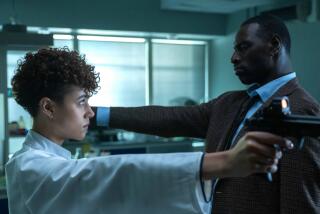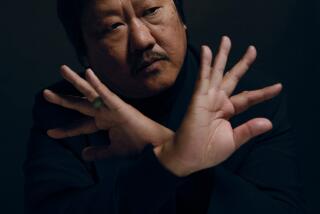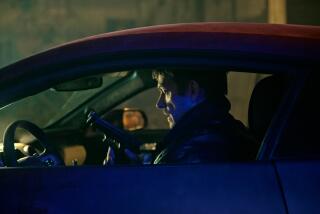Reassembling his old ‘Ashes’
- Share via
When THE Asian financial crisis hit Hong Kong a decade ago, the lab where director Wong Kar Wai stored his prints went into bankruptcy.
On extremely short notice, Wong had to retrieve all his materials in just one evening. Much to his chagrin, Wong discovered that the lab hadn’t been storing his prints in ideal conditions. His first independent production, the 1994 martial-arts epic “Ashes of Time,” was in dire straits.
“When we checked all the material, ‘Ashes of Time’ was in a very bad situation because the film was actually in pieces,” explains the 50-year-old filmmaker (“In the Mood for Love,” “2046”) during a recent visit to Los Angeles. “The negatives were soaked [with water] and had marks and scratches. We realized we would have to do something, otherwise the film wouldn’t exist. We were forced to revisit the film.”
While concurrently making other movies, Wong spent over five years restoring and restructuring the cerebral martial-arts drama. “Ashes of Time Redux,” which recently screened to warm notices at the Cannes and Toronto Film festivals, opens Friday in theaters.
A new approach
Back IN 1992, someone suggested to Wong that he read Louis Cha’s martial-arts epic “The Eagle Shooting Heroes.” The four-volume novel revolved around two elderly heroes, the Lord of the East and the Lord of the West.
“It was first published in the 1950s,” says Wong. “It is like the second bestseller only to Chairman Mao’s book. Generations of people have read this book. Now people consider it more than a martial-arts novel. Some compare it to [serious] literature.”
“The Eagle Shooting Heroes” had been adapted several times before for the screen. So Wong tried a different approach: He would do a prequel, presenting the two protagonists as young men.
“Ashes of Time” “was very controversial because it’s not exactly what people would have imagined,” he says. Revisiting these characters before they became lords, Wong determined “we would have more space for ourselves to figure out the story. I read in one article Cha said his inspiration for these two characters came from Shakespeare, so I grabbed everything I know about Shakespeare, westerns, Chinese martial arts and Japanese samurai films. It is more like Shakespeare versus Sergio Leone, but in China.”
The late Hong Kong actor and pop superstar Leslie Cheung (“Farewell, My Concubine”) stars as Ouyang Feng, a mysterious man who lives in the Chinese western desert after he was rejected by the love of his life.
Cynical and without remorse, he makes a living hiring swordsmen to do contract killings. He becomes known as the Lord of the East.
Tony Leung Ka Fai plays Huang Yaoshi, Feng’s swordsman friend who visits him in the desert every year to tell him his adventures. He becomes the Lord of the West.
Though “Ashes of Time” was released in Asia and in France in 1994, it played only Chinatown cinemas in the U.S. So when it came time for Wong to restore the film, it was difficult finding prints from overseas distributors.
Eventually he found usable materials at the Museum of Chinese History in New York, as well as a warehouse in San Francisco that belonged to an owner of a Chinatown cinema that had been shut down.
But even with this material, “Ashes of Time” wasn’t complete. “When we got all the material and looked at it, we realized a 100% restoration wasn’t possible,” he explains. “Part of the film was too bad to be restored.”
The only way to salvage the film was to restructure the story. The original version, he says, is less straightforward than “Deux.”
“The film is now 10 minutes shorter than the original,” he says. “We had to replace some of the parts with alternative takes.”
And the film is now structured into chapters just as a novel. “We used other takes from the material [we had] to create a linkage [between chapters].”
Resurrecting “Ashes of Time” was an emotional experience for Wong, not just because of his memories of his frequent collaborator Cheung, who committed suicide five years ago at age 46 but also because “Ashes” was his first independent production.
“This was the only way you could make films you really believed in and cared about,” he says. “It tells you a lot about Hong Kong cinema in the 1990s. It was one of the best moments ever . . . you can see the energy and possibilities. This is where we came from.”
--
More to Read
Only good movies
Get the Indie Focus newsletter, Mark Olsen's weekly guide to the world of cinema.
You may occasionally receive promotional content from the Los Angeles Times.











